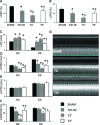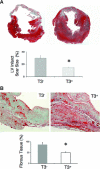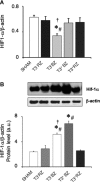Early long-term L-T3 replacement rescues mitochondria and prevents ischemic cardiac remodelling in rats
- PMID: 20100314
- PMCID: PMC3922373
- DOI: 10.1111/j.1582-4934.2010.01014.x
Early long-term L-T3 replacement rescues mitochondria and prevents ischemic cardiac remodelling in rats
Abstract
3,5,3'-Levo-triiodothyronine (L-T3) is essential for DNA transcription, mitochondrial biogenesis and respiration, but its circulating levels rapidly decrease after myocardial infarction (MI). The main aim of our study was to test whether an early and sustained normalization of L-T3 serum levels after MI exerts myocardial protective effects through a mitochondrial preservation. Seventy-two hours after MI induced by anterior interventricular artery ligation, rats were infused with synthetic L-T3 (1.2 μg/kg/day) or saline over 4 weeks. Compared to saline, L-T3 infusion restored FT3 serum levels at euthyroid state (3.0 ± 0.2 versus 4.2 ± 0.3 pg/ml), improved left ventricular (LV) ejection fraction (39.5 ± 2.5 versus 65.5 ± 6.9%), preserved LV end-systolic wall thickening in the peri-infarct zone (6.34 ± 3.1 versus 33.7 ± 6.21%) and reduced LV infarct-scar size by approximately 50% (all P < 0.05). Moreover, L-T3 significantly increased angiogenesis and cell survival and enhanced the expression of nuclear-encoded transcription factors involved in these processes. Finally, L-T3 significantly increased the expression of factors involved in mitochondrial DNA transcription and biogenesis, such as hypoxic inducible factor-1α, mitochondrial transcription factor A and peroxisome proliferator activated receptor γ coactivator-1α, in the LV peri-infarct zone. To further explore mechanisms of L-T3 protective effects, we exposed isolated neonatal cardiomyocytes to H(2)O(2) and found that L-T3 rescued mitochondrial biogenesis and function and protected against cell death via a mitoKATP dependent pathway. Early and sustained physiological restoration of circulating L-T3 levels after MI halves infarct scar size and prevents the progression towards heart failure. This beneficial effect is likely due to enhanced capillary formation and mitochondrial protection.
© 2011 The Authors Journal of Cellular and Molecular Medicine © 2011 Foundation for Cellular and Molecular Medicine/Blackwell Publishing Ltd.
Figures







Similar articles
-
p38 mitogen-activated protein kinase inhibition improves cardiac function and attenuates left ventricular remodeling following myocardial infarction in the rat.J Am Coll Cardiol. 2004 Oct 19;44(8):1679-89. doi: 10.1016/j.jacc.2004.07.038. J Am Coll Cardiol. 2004. PMID: 15489104
-
Bendavia, a mitochondria-targeting peptide, improves postinfarction cardiac function, prevents adverse left ventricular remodeling, and restores mitochondria-related gene expression in rats.J Cardiovasc Pharmacol. 2014 Dec;64(6):543-53. doi: 10.1097/FJC.0000000000000155. J Cardiovasc Pharmacol. 2014. PMID: 25165999
-
Improvement of left ventricular remodeling after myocardial infarction with eight weeks L-thyroxine treatment in rats.J Transl Med. 2013 Feb 14;11:40. doi: 10.1186/1479-5876-11-40. J Transl Med. 2013. PMID: 23409791 Free PMC article.
-
A review of studies relating to thyroid hormone therapy in brain-dead organ donors.Front Biosci (Landmark Ed). 2009 Jan 1;14(10):3750-70. doi: 10.2741/3486. Front Biosci (Landmark Ed). 2009. PMID: 19273308 Review.
-
The Potential of Thyroid Hormone Therapy in Severe COVID-19: Rationale and Preliminary Evidence.Int J Environ Res Public Health. 2022 Jun 30;19(13):8063. doi: 10.3390/ijerph19138063. Int J Environ Res Public Health. 2022. PMID: 35805716 Free PMC article. Review.
Cited by
-
T3 and T4 decrease ROS levels and increase endothelial nitric oxide synthase expression in the myocardium of infarcted rats.Mol Cell Biochem. 2015 Oct;408(1-2):235-43. doi: 10.1007/s11010-015-2501-4. Epub 2015 Jul 10. Mol Cell Biochem. 2015. PMID: 26160278
-
Prevalence and Clinical Significance of Low T3 Syndrome in Non-Dialysis Patients with Chronic Kidney Disease.Med Sci Monit. 2016 Apr 8;22:1171-9. doi: 10.12659/msm.895953. Med Sci Monit. 2016. PMID: 27056188 Free PMC article.
-
Role of miR-133/Dio3 Axis in the T3-Dependent Modulation of Cardiac mitoK-ATP Expression.Int J Mol Sci. 2022 Jun 11;23(12):6549. doi: 10.3390/ijms23126549. Int J Mol Sci. 2022. PMID: 35742991 Free PMC article.
-
High triiodothyronine levels induce myocardial hypertrophy via BAFF overexpression.J Cell Mol Med. 2022 Aug;26(16):4453-4462. doi: 10.1111/jcmm.17470. Epub 2022 Jul 8. J Cell Mol Med. 2022. PMID: 35808902 Free PMC article.
-
Cardioprotection and thyroid hormones.Heart Fail Rev. 2016 Jul;21(4):391-9. doi: 10.1007/s10741-016-9545-8. Heart Fail Rev. 2016. PMID: 27011011 Review.
References
-
- Iervasi G, Pingitore A, Landi P, et al. Low-T3 syndrome: a strong prognostic predictor of death in patients with heart disease. Circulation. 2003;107:708–13. - PubMed
-
- Pingitore A, Galli E, Barison A, et al. Acute effects of triiodothyronine (T3) replacement therapy in patients with chronic heart failure and low-T3 syndrome: a randomized, placebo-controlled study. J Clin Endocrinol Metab. 2008;93:1351–8. - PubMed
-
- Hamilton MA, Stevenson LW, Luu M, et al. Altered thyroid hormone metabolism in advanced heart failure. J Am Coll Cardiol. 1990;16:91–5. - PubMed
-
- Wiersinga WM, Lie KI, Touber JL. Thyroid hormones in acute myocardial infarction. Clin Endocrinol. 1981;14:367–74. - PubMed
-
- Friberg L, Drvota V, Bjelak AH, et al. Association between increased levels of reverse triiodothyronine and mortality after acute myocardial infarction. Am J Med. 2001;111:699–703. - PubMed
Publication types
MeSH terms
Substances
Grants and funding
LinkOut - more resources
Full Text Sources
Medical

